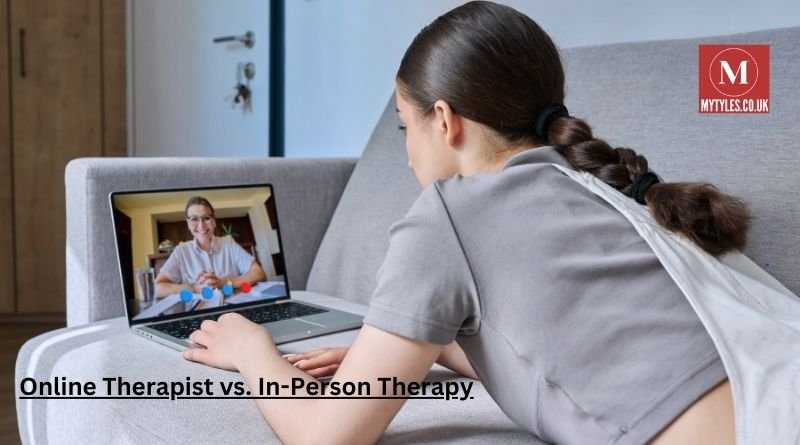Finding the right kind of therapy can be a challenging decision. With advancements in technology, online therapy sessions have emerged as a convenient and flexible alternative to traditional in-person therapy. But how do you decide which approach is best for your needs? Let’s break down the differences to help you make an informed choice.
Understanding Online Therapy and In-Person Therapy
Both online therapy and in-person therapy aim to provide mental health support, but the way they are delivered varies significantly.
Online Therapy: Conducted through digital platforms like video calls, chat, or phone calls. It offers flexibility and accessibility for those with busy schedules or limited access to local therapists. Many individuals find an online therapist more approachable, especially when starting therapy for the first time.
In-Person Therapy: Traditional therapy involves visiting a therapist’s office for face-to-face sessions. It’s known for creating a personal connection, especially for individuals who prefer direct human interaction.
Advantages of Online Therapy
1. Convenience and Accessibility
Online therapy sessions can be accessed from the comfort of your home. This is particularly beneficial for people living in remote areas or those with mobility challenges.
2. Flexibility
Scheduling an appointment with an online psychologist is easier, as sessions are not limited by location. You can book sessions during your lunch break or even late at night, depending on the therapist’s availability.
3. Privacy and Anonymity
Some individuals feel more comfortable sharing their thoughts in an online setting. Online therapy allows for anonymity, which can help in discussing sensitive topics.
4. Affordability
Online counselling tends to be more cost-effective, as therapists often have lower overhead costs and may pass those savings on to clients.
Advantages of In-Person Therapy
1. Non-Verbal Communication
Face-to-face interaction allows therapists to observe body language and physical cues, which can be crucial in understanding emotions and behaviors.
2. Therapeutic Environment
The structured environment of a therapist’s office provides a space specifically designed for healing and personal growth.
3. Deeper Emotional Connection
Many clients find it easier to build a strong rapport with their therapist when they meet in person, which can enhance the effectiveness of therapy.
Key Considerations: Which One is Best for You?
1. Your Schedule and Lifestyle
If you have a packed schedule or travel frequently, online therapy may be the better option due to its flexibility. Conversely, if you prefer a routine, in-person therapy may help you establish a consistent self-care practice.
2. Nature of Your Concern
Certain conditions, like severe anxiety or trauma, might benefit more from in-person therapy where a therapist can offer immediate emotional support. However, for stress management or relationship counseling, an online counsellor may be equally effective.
3. Comfort Level
If you’re new to therapy, starting online might feel less intimidating. On the other hand, those who value direct interaction might prefer in-person sessions.
4. Budget
Online therapy can be a cost-effective solution for those on a tight budget, whereas in-person therapy might come with additional costs like travel.
Research and Insights
Studies show that online therapy can be as effective as in-person therapy for many mental health conditions, including depression, anxiety, and PTSD. According to a study published in the Journal of Affective Disorders, patients using online therapy reported significant improvements in mental health comparable to traditional therapy.
FAQs
1. Is online therapy as effective as in-person therapy?
Yes, online therapy can be as effective as in-person therapy for various mental health issues. Studies confirm that conditions like depression and anxiety respond well to both formats.
2. Can I switch between online and in-person therapy?
Absolutely. Many therapists offer hybrid models where you can alternate between online and in-person sessions depending on your schedule and preferences.
3. What should I consider when choosing an online therapist?
Look for qualifications, experience, and reviews. Platforms offering online therapy in India often provide verified profiles of licensed professionals to help you make an informed decision.
4. How private are online therapy sessions?
Reputable platforms prioritize privacy by using secure, encrypted systems. Ensure the platform and therapist you choose comply with privacy regulations like HIPAA.
5. Is online therapy suitable for severe mental health conditions?
Online therapy can work for severe conditions, but it’s essential to assess whether remote support meets your specific needs. In-person therapy might be better for situations requiring immediate intervention or crisis management.
Final Thoughts
Choosing between online and in-person therapy depends on your unique circumstances, preferences, and the nature of your concerns. Both approaches have their strengths, and it’s ultimately about finding what works best for you. If convenience and accessibility are priorities, exploring online therapy sessions might be the way to go. For those who value face-to-face interaction, in-person therapy could be more suitable.
Whatever you choose, the most important step is to prioritize your mental health and seek help when you need it.




